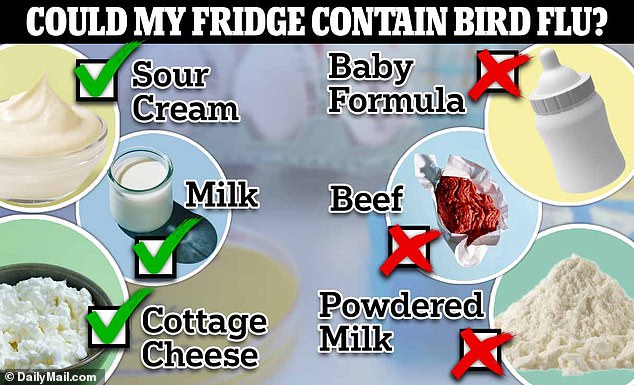Ice cream, butter and cheese are among the latest products the FDA will test for bird flu, amid a rampant outbreak in dairy cows.
In a statement, the agency revealed that it would sample 155 products purchased at grocery stores across the country for traces of the H5N1 virus.
If any test positive for the virus, further testing will be carried out to determine if the virus they contain is “live” or capable of causing infection in humans.
The expanded testing builds on previous tests, which found the virus in milk, cottage cheese and sour cream from grocery stores, but in all cases, the virus was “dead” and could not cause infection in humans.
Ground beef, infant formula and powdered milk were also tested for the virus, and all tested negative.
A check mark indicates foods that tested positive for bird flu, while an X indicates those that were tested for bird flu but were not found to contain the virus.
More than 120 dairy herds across the United States have tested positive for bird flu, prompting increased concern among health officials about the virus entering this country’s food supply.
Authorities have so far suggested that the risk to the public is “low” because dairy products are pasteurized (milk is rapidly heated to 162 degrees Fahrenheit (72 Celsius) and then cooled) to eliminate any dangerous pathogens.
Tests have shown that bird flu virus fragments found in products do not multiply in laboratory experiments, revealing that they are “dead” or unable to make copies of themselves and infect humans.
However, those who drink raw milk and its products are at risk because the products are not pasteurized and could still contain “live” viruses.
Authorities have urged people not to consume raw milk or any products containing it.
But the scare has had the opposite effect for many: data suggests raw milk sales have increased by 21 percent. A farm in California says it can barely keep milk on its shelves.
And fitness influencers and stay-at-home moms are encouraging people to drink raw dairy products.
There have been no reported cases of people getting bird flu after eating dairy products from grocery stores or ground meat.
But in April, a former FDA official warned DailyMail.com that there was a risk of contracting the virus from steaks that were not cooked sufficiently, saying the virus could survive by cooking in the centre of the meat and then be consumed by people.
In addition to the new products, the FDA said in the press that it would also test more samples of pasteurized milk, cheese and cream cheese.
It will collect samples from stores across the United States, even in states where testing has not been done, and take them to its labs to be tested for the virus.
Previously, 300 samples of milk and cream cheese from states such as New York, New Jersey, California and Texas were analyzed.
Of these, 60 (or 20 percent) were found to contain the virus.
The FDA did not reveal the names of the products contaminated with bird flu and said it plans to publish the full results in the “near future.”
There are no known herds of infected dairy cows contributing to the raw milk supply, said Eric Deeble, USDA’s acting senior adviser for its avian flu response.
So far this year, three dairy farm workers have contracted bird flu in the United States, one in Texas and two in Michigan. All three worked closely with cattle infected with the virus.
The CDC says it has monitored 690 people who were exposed to animals suspected or confirmed to be infected with bird flu, officials say.
Fifty-one people have also been tested and developed flu-like symptoms.


